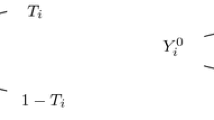Abstract
The methodology of randomised response (RR) has advanced considerably in recent years. Nevertheless, most research in this area has addressed the estimation of qualitative variables, and relatively little attention has been paid to the study of quantitative ones. Furthermore, most studies concern only simple random sampling. In this paper, we present a new model of RR aimed at determining a total that is valid for any sampling design. This general procedure includes several important RR techniques that constitute particular cases. We propose an unbiased estimator, with an analytic expression for its variance. Confidence intervals are also obtained for the parameter, applying analytical formulae such as those based on resampling technologies. A simulation study illustrates the behaviour of the estimator using diverse randomisation devices and for different scrambling distributions. To illustrate the advantages of this method, we obtained a stratified clustered sample of university students, who were questioned to determine the frequency with which they cheated in exams. Their responses to these questions were obtained via an RR technique, and also using a direct questionnaire. We conclude that estimates based on anonymous questionnaires may result in severe underestimation.











Similar content being viewed by others
References
Arnab, R.: Non-negative variance estimation in randomized response surveys. Commun. Stat. Theor. Methods 23, 1743–1752 (1994)
Arnab, R.: Optimum sampling strategies under randomized response surveys. Biom. J. 44, 1–16 (2002)
Arnab, R.: Optional randomized response techniques for complex survey designs. Biom. J. 46, 114–124 (2004)
Bar-Lev, S.K., Bobovitch, E., Boukai, B.: A note on randomized response models for quantitative data. Metrika 60, 255–260 (2004)
Bouza, C.: Ranked set sampling and randomized response procedures for estimating the mean of a sensitive quantitative character. Metrika 70, 267–277 (2009)
Bouza, C., Herrera, C., Mitra, P.: A review of randomized responses procedures: the qualitative variable case. Rev. Investig. Oper. 31, 240–247 (2010)
Chaudhuri, A.: Randomized Response and Indirect Questioning Techniques in Surveys. Chapman & Hall, London (2011)
Chang, H.J., Wang, C.L., Huang, K.C.: On Estimating the proportion of a qualitative sensitive character using randomized response sampling. Qual. Quant. 38, 675–680 (2004)
Coutts, E., Jann, B.: Sensitive questions in online surveys: experimental results for the randomized response technique (RRT) and the unmatched count technique (UCT). Sociol. Methods Res. 40, 169–193 (2011)
Diana, G., Perri, P.F.: A new scrambled response models for estimating the mean of a sensitive quantitative character. J. Appl. Stat. 37, 1875–1890 (2010)
Diana, G., Perri, P.F.: Calibration-based approach to sensitive data: a simulation study. J. Appl. Stat. 39, 53–65 (2012)
Eichhorn, B., Hayre, L.S.: Scrambled randomized response methods for obtaining sensitive quantitative data. J. Stat. Plan. Inference 7, 307–316 (1983)
Eriksson, S.A.: A new model for randomized response. Int. Stat. Rev. 41, 40–43 (1973)
Fox, J.P., Wyrick, C.: A mixed effects randomized item response model. J. Educ. Behav. Stat. 33, 389–415 (2008)
Fox, J.P., Meijer, R.R.: Using item response theory to obtain individual information from randomized response data: an application using cheating data. Appl. Psychol. Meas. 32, 595–610 (2008)
Gjestvang, C.R., Singh, S.: A new randomized response model. J. R. Stat. Soc. Ser. B 68, 523–530 (2006)
Gjestvang, C.R., Singh, S.: Forced quantitative randomized response model: a new device. Metrika 66, 243–257 (2007)
Greenberg, B.G., Kuebler, R.R., Abernathy, J.R., Horvitz, D.G.: Application of the randomized response technique in obtaining quantitative data. J. Am. Stat. Assoc. 66, 243–250 (1971)
Huang, K.C.: Estimation for sensitive characteristics using optional randomized response technique. Qual. Quant. 42, 679–686 (2008)
Krumpal, I.: Determinants of social desirability bias in sensitive surveys: a literature review. Qual. Quant. 47, 2025–2047 (2013)
Lensvelt-Mulders, G.J.L.M., Hox, J.J., van der Heijden, P.G.M., Maas, C.J.M.: Meta-analysis of randomized response research: thirty-five years of validation. Sociol. Methods Res. 33, 319–348 (2005)
Lara, D., Strickler, J., Olavarrieta, C., Ellertson, C.: Measuring induced abortion in Mexico: a comparison of four methodologies. Sociol. Methods Res. 32, 529–58 (2004)
Odumade, O., Singh, S.: An alternative to the Bar-Lev, Bobovitch and Boukai randomized response model. Sociol. Methods Res. 39, 206–21 (2010)
Pollock, K.H., Bek, Y.: A comparison of three randomized response models for quantitative data. J. Am. Stat. Assoc. 71, 884–886 (1976)
Saha, A.: A simple randomized response technique in complex surveys. Metron LXV, 59–66 (2007)
Scheers, N.J., Dayton, C.M.: Improved estimation of academic cheating behavior using the randomized response technique. Res. High. Educ. 26, 61–69 (1987)
Singh, S., Kim, J.M.: A pseudo-empirical log-likelihood estimator using scrambled responses. Stat. Probab. Lett. 81, 345–351 (2007)
Tillé, Y., Matei, A.: Sampling: survey sampling. R package version 2.5. http://CRAN.R-project.org/package=sampling (2012)
Tracy, D., Mangat, N.: Some development in randomized response sampling during the last decade-A follow up of review by Chaudhuri and Mukerjee. J. Appl. Stat. Sci. 4, 533–544 (1996)
van den Hout, A., van der Heijden, P.G.M., Gilchrist, R.: The logistic regression model with response variables subject to randomized response. Comput. Stat. Data Anal. 51, 6060–6069 (2007)
van der Heijden, P.G.M., van Gils, G., Bouts, J., Hox, J.J.: A comparison of randomized response, computer-assisted self-interview, and face-to-face direct questioning: eliciting sensitive information in the context of welfare and unemployment benefit. Sociol. Methods Res. 28, 505–537 (2000)
Warner, S.L.: Randomized response: a survey technique for eliminating evasive answer bias. J. Am. Stat. Assoc. 60, 63–69 (1965)
Wolter, K.M.: Introduction to Variance Estimation, 2nd edn. Springer, Berlin (2007)
Acknowledgments
This study was partially supported by Ministerio de Educación y Ciencia (grant MTM2012-35650, Spain) and by Consejería de Economía, Innovación, Ciencia y Empleo (grants SEJ2954 and HUM1413 Junta de Andalucía).
Author information
Authors and Affiliations
Corresponding author
Rights and permissions
About this article
Cite this article
Arcos, A., Rueda, M.M. & Singh, S. A generalized approach to randomised response for quantitative variables. Qual Quant 49, 1239–1256 (2015). https://doi.org/10.1007/s11135-014-0046-3
Published:
Issue Date:
DOI: https://doi.org/10.1007/s11135-014-0046-3




